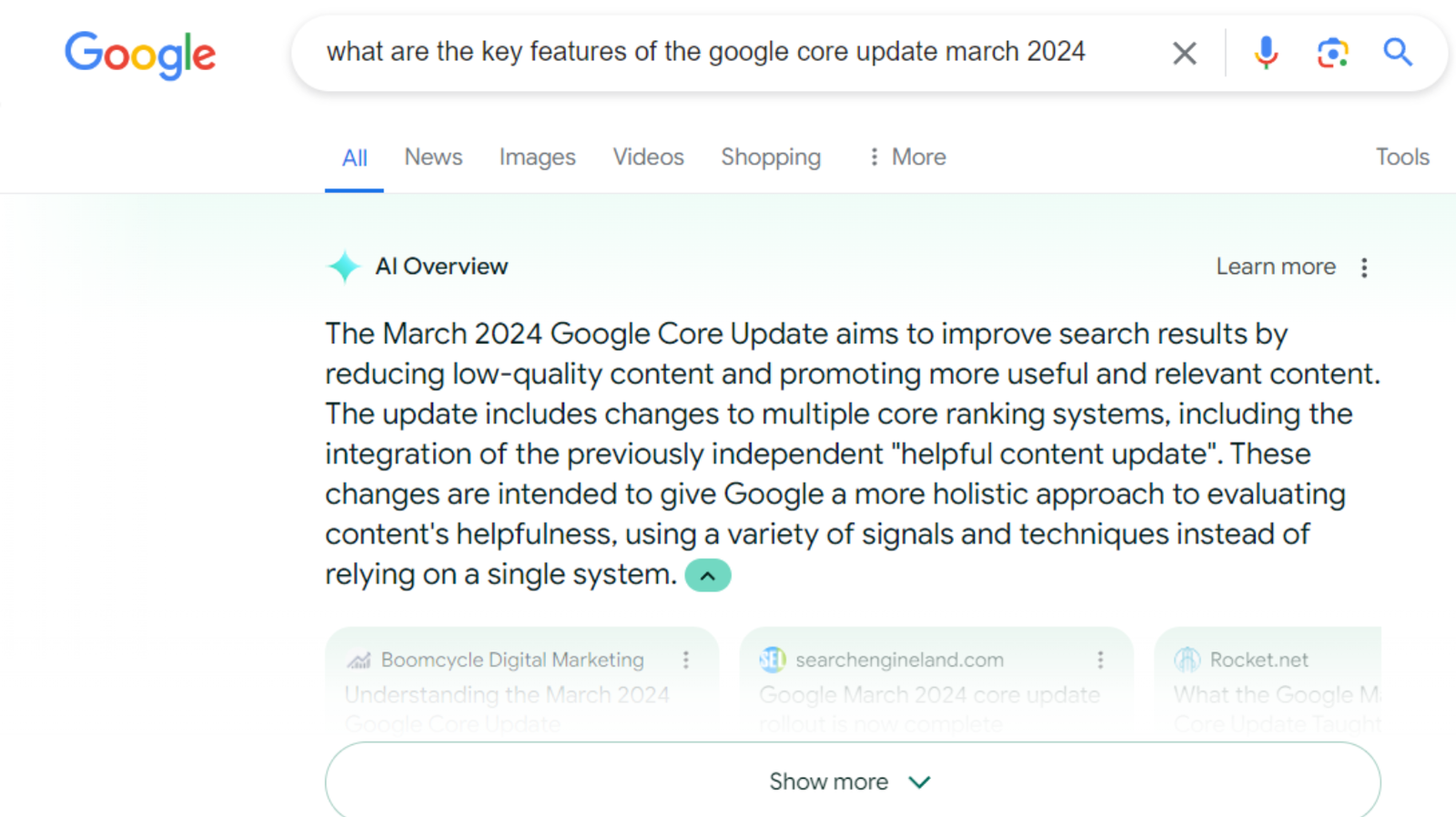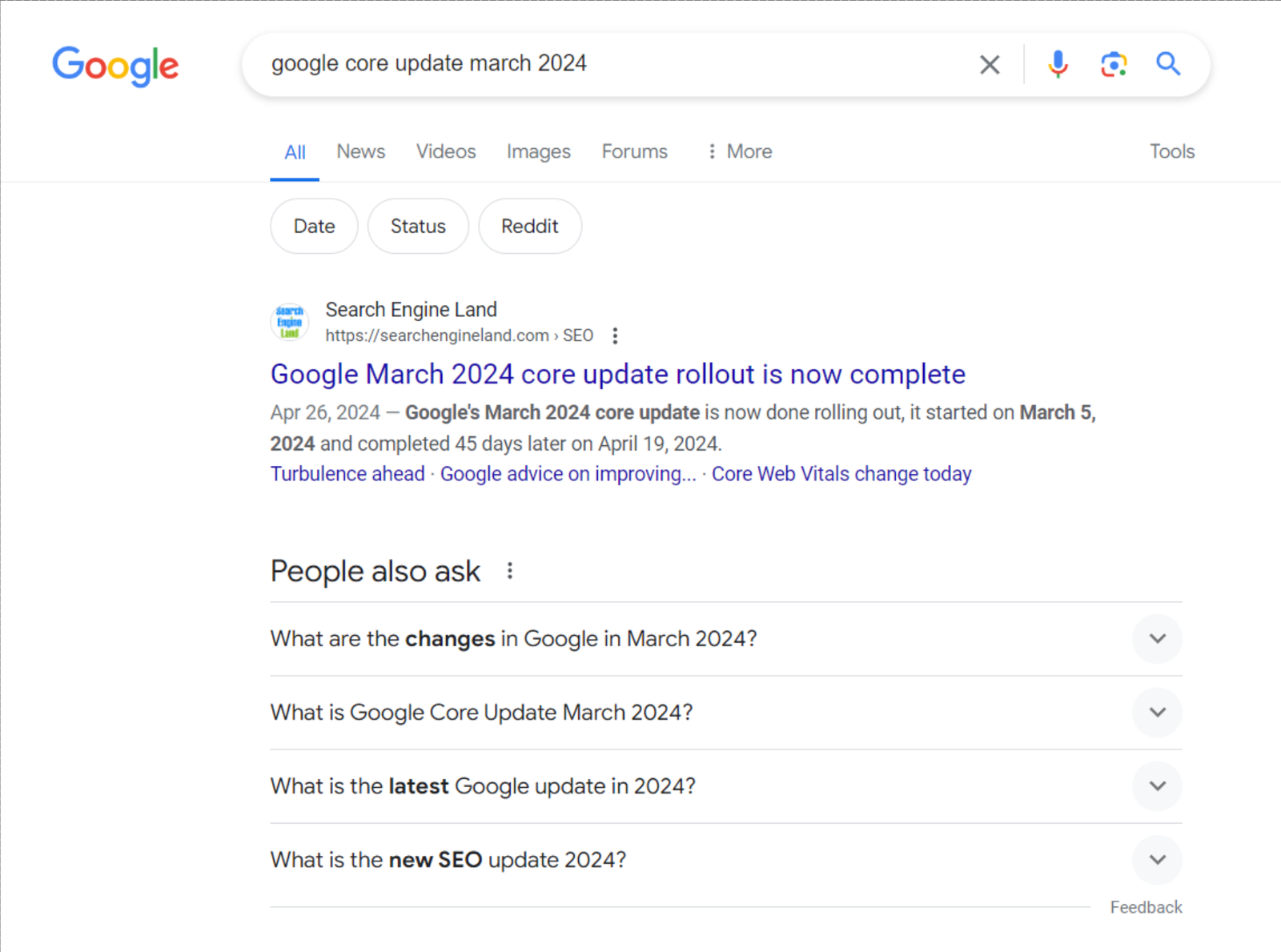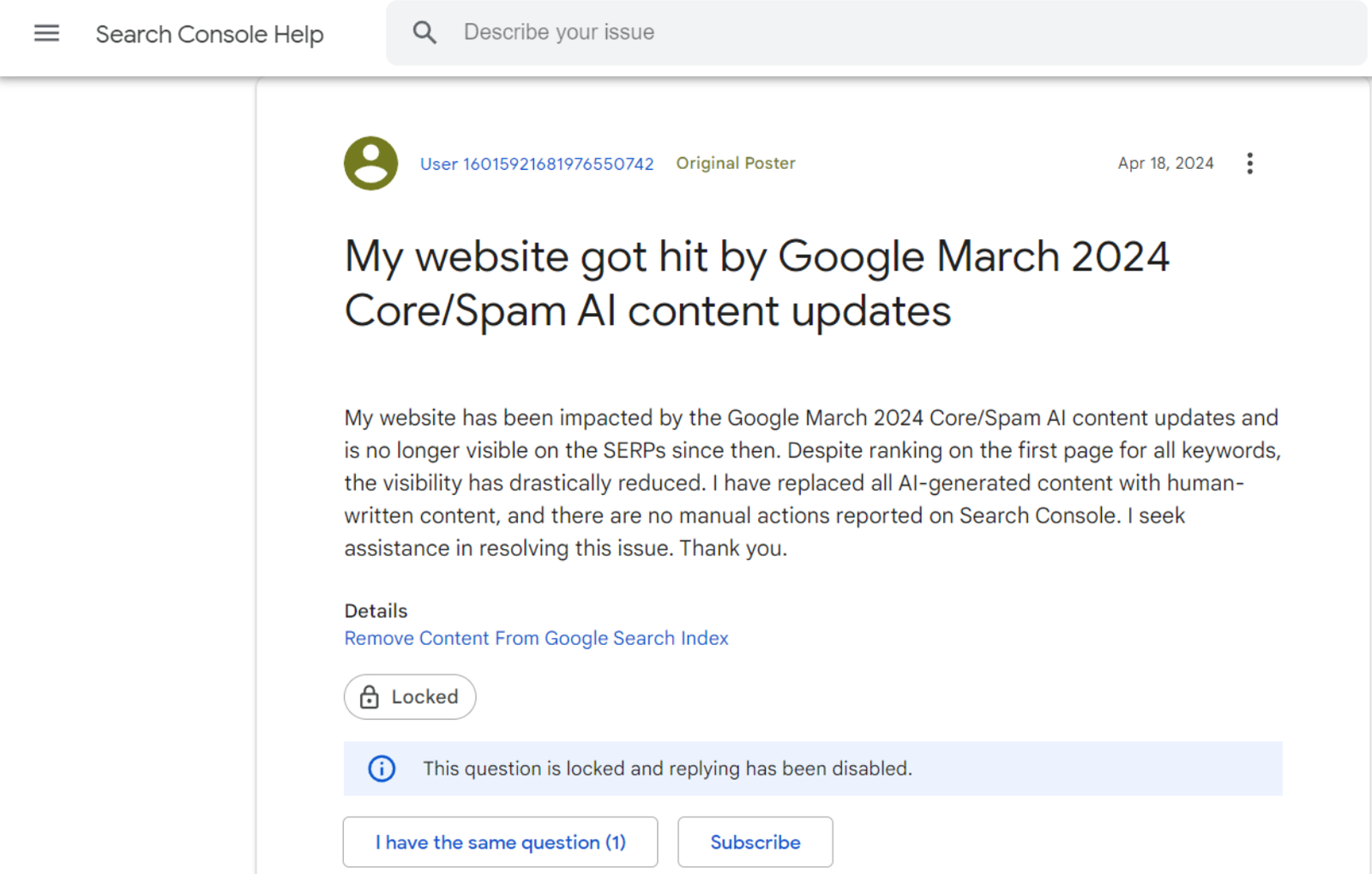

What Does the March 2024 Google Core Update Mean for Websites & SEO?
The March 2024 Google Core Update emphasizes high-quality content, penalizes low-quality AI content, improves mobile user experience, and enhances spam detection. Sites must focus on E-E-A-T principles and adapt their SEO strategies for better rankings and visibility.

What Does the March 2024 Google Core Update Mean for Websites & SEO?
The March 2024 Google Core Update has sent ripples across the digital landscape, prompting website owners and SEO professionals to reevaluate their strategies and adapt to the evolving search engine algorithms.
As Codepoet explores the intricacies of this significant update, it becomes clear that adapting to these changes is paramount for maintaining visibility and relevance in the competitive online sphere. Let’s unravel the implications of the latest Google Core Update and shed light on what it means for websites and SEO best practices.
Key Takeaways
- The March 2024 Google Core Update favors websites with high-quality content, penalizes low-quality AI content, focuses on a great mobile user experience, emphasizes E-E-A-T, and is more effective at filtering out spammy websites.
- AI Overviews are similar to Google’s featured snippets but can handle more complex queries powered by advanced AI.
- Some websites have benefited from Google’s AI Overviews, while others have suffered a decline in traffic and visibility.
- Learn nine ways to recover from the March 2024 Google Core Update if your site is negatively impacted.
What Is a Google Core Update?
A Google Core Update substantially modifies Google's search algorithm, fundamentally altering how websites rank in search results. These updates enhance the algorithm's ability to evaluate web pages, ensuring users receive the most relevant and high-quality information for their queries.
By refining the ranking criteria, Google aims to better understand and assess websites' content, structure, and overall user experience. However, these notable shifts in search rankings result in some sites improving their positions while others may see declines.
Features of the March 2024 Google Update
The March 2024 Google Update elevates the user experience by prioritizing top-tier, reliable, and captivating content in search result rankings. Its impact is most pronounced on informational content, such as blogs, instead of sales-oriented material. Below are the five pivotal aspects of this update:
- Prioritizing content quality
- Penalizing low-quality AI-generated content
- Focus on mobile user experience
- Emphasis on E-E-A-T
- Improved spam detection
1. Prioritizing Content Quality
The latest update emphasizes informative, valuable content, ensuring users receive the best possible information. Articles and other website content should be thoroughly researched, accurately sourced, and thoughtfully written to provide real value to readers.
2. Penalizing Low-Quality AI-Generated Content
Conversely, the update penalizes websites that rely on low-quality, AI-generated content lacking depth, originality, and accuracy. Google seeks to reward authentic, original content. Delivering well-crafted, valuable material is crucial to heightening your search engine rankings and user satisfaction.
3. Focus on Mobile User Experience
Google now focuses on mobile-first indexing and predominantly uses mobile websites for ranking. This shift highlights the importance of mobile-friendly content that provides a smooth and interactive experience across various devices.
Business owners must ensure that their sites have optimized text, images, and videos that load quickly and display correctly on smartphones and tablets. They must make sure any site navigation and interactive elements are easy to use on smaller screens.
4. Emphasis on E-E-A-T
The update underscores the critical role of E-E-A-T—Experience, Expertise, Authoritativeness, and Trustworthiness—in content creation. Google now emphasizes these principles more than ever:
- Experience refers to the firsthand knowledge and practical understanding reflected in the content. Google looks for content that demonstrates the author's real-world experience and insights.
- Expertise highlights the importance of specialized knowledge in a particular field. Google prioritizes content that is crafted by individuals or organizations with recognized credentials, certifications, or substantial experience in the subject matter.
- Authoritativeness pertains to the credibility and influence a site or author holds within their industry. Google evaluates the reputation of the author or website, considering factors such as high-quality backlinks, mentions from reputable sources, and a solid online presence.
- Trustworthiness involves the reliability and integrity of the content and the site that hosts it. Google assesses whether their site is transparent about its authorship, sources its information properly, and maintains secure and user-friendly practices.
By focusing on E-E-A-T, Google aims to provide users with content that is accurate, authoritative, and created by individuals or organizations with genuine expertise and a trustworthy reputation.
5. Improved Spam Detection
Since May 5, the latest Google update has significantly improved its ability to detect and filter out spammy websites, ensuring a higher quality of search results for users. The new spam policies focus on the following three areas:
- Expired Domain Abuse: Websites that repurpose expired domains, often laden with low-quality content from previous owners, are now more likely to be flagged as spam. They’re typically used to manipulate search rankings by capitalizing on the domain’s previous authority or backlinks.
- Scaled Content Abuse: Mass-producing low-quality, automated content designed solely to improve search engine rankings lacks depth and value. Google’s enhanced detection capabilities now filter it out more effectively.
- Site Reputation Abuse: Sites with a history of providing unreliable or misleading information are more likely to be penalized, ensuring that reputable, high-quality websites are given prominence in search results.
What Are Google AI Overviews?
AI Overviews encompass concise synopses created by Google's generative AI, prominently featured atop search engine results pages (SERPs) for numerous long-tail queries. These summaries leverage natural language processing (NLP), a sophisticated form of machine learning, to grasp query contexts and provide precise and pertinent responses to user inquiries.
AI Overview Example
Below is a screenshot showing an example of an AI Overview for the long-tail query: “what are the key features of the google core update March 2024.”

However, not all search queries will trigger AI Overviews. For instance, the simpler query “Google core update March 2024” does not.

It’s important to note that Google AI Overviews is not an expanded beta or opt-in feature—it’s unavoidable and likely permanent. Unfortunately, Google has said they won’t report which keywords prompt AI Overviews in Search Console.
Google AI Overview Fails
Remember that Google’s generative AI is still fresh and experimental, so not all AI Overview responses are accurate. Some of their answers are misleading and even dangerous. Many people are sharing examples of serious AI Overview mistakes on social media, such as the following:
- Google described the health benefits of running with scissors and bathing with a toaster.
- Google said a dog played in the NHL.
- Google suggested using non-toxic glue to give pizza sauce more tackiness.
- Google said we had one Muslim president, Barack Obama, who is not Muslim.
- Google said you should eat at least one small rock daily to help digestion.
Although the Google AI Overviews feature aims to streamline users' quest for answers, it's intriguing to observe a significant surge in searches for "how to disable AI overview" following its implementation.
Positive & Negative Impacts of the March 2024 Google Core Update
Let’s discuss some of the nuanced effects of the March 2024 Google Core Update and explore the positive and negative ramifications for websites.
Positive Impacts
Each AI Overview response links to sources that dive into the topic further. According to Google Search Central, “Google's systems automatically determine which links appear. There is nothing special for creators to do to be considered other than to follow our regular guidance for appearing in search, as covered in Google Search Essentials.”
Smaller businesses optimizing their sites for AI are ranking high in competition with more prominent brands. NP Digital claims it’s an opportunity rather than a threat for most industries.
For instance, in their most recent webinar on June 4, NP Digital shared some encouraging insights about the positive impact of AI Overviews on several clients during the first week of the rollout:
- The weekly trend for impressions and clicks was the same.
- They received fewer impressions, but the number of clicks increased along with the click-through rate.
- Not only are their clients still ranking, but they may be ranking in ways they weren’t before.
Negative Impacts
Other content creators, however, are not so fortunate. A prime example of the detrimental impact of the recent series of Google Core Updates is the case of HouseFresh.com.
Founded in 2020 by Gisele Navarro and her husband, HouseFresh.com initially gained success by providing original content on indoor air quality products, earning top spots in Google search results. However, after Google's algorithm updates in September 2023 and March 2024, the website suffered plummeting traffic, leading to layoffs and an uncertain future.
Navarro said in an interview with BBC in May: “It decimated us. Suddenly, the search terms that used to bring up HouseFresh were sending people to big lifestyle magazines that clearly don't even test the products. The articles are full of information that I know is wrong. We just got absolutely crushed.”
Unfortunately, HouseFresh.com is not an isolated case. Below are some recent posts to Google Search Console Help by other content creators about issues with the March 2024 Core Update:

Source: Google Search Console Help
![]()
Source: Google Search Console Help
9 Ways to Recover from the Google Core Update
How can you recover if the March 2024 Google Core Update has negatively impacted your website traffic and search visibility?
Generative Engine Optimization (GEO) is the new SEO strategy for adapting to conversational AIs. NP Digital’s June 4th webinar “Don’t Panic, But...Google Released a Big AI Update for SEO (Here’s How to Adapt)” discussed nine ways your website can evolve with Google’s shifting digital landscape:
- Cite sources and add quotes and statistics.
- Prioritize E-E-A-T signals.
- Cover topics thoroughly.
- Rely on human oversight of content creation.
- Be the first to answer new questions.
- Prioritize readability.
- Expand other content formats.
- Elevate your content with structured data.
- Optimize your site structure.
1. Cite Sources, Quotes, & Statistics
According to NP Digital’s webinar, incorporating well-sourced citations, quotes, and statistics within your website content can potentially enhance visibility by up to 40%. However, the efficacy of citations hinges on their quality and relevance in an age marked by misinformation.
To uphold credibility and foster trust, adhere to these best practices when integrating citations into your content:
- Link to the original source. Avoid linking through intermediary sources like roundup posts or infographics that may lead to broken links.
- Check the publication date. Is the data invalid or outdated? Determine its appropriateness based on the relevance and availability of more recent data, especially in rapidly evolving subjects.
- Consider the context. Is the data relevant to your topic? Does it support your claim or illustrate your point? Acknowledge any limitations or biases inherent in the data.
- Check the source. Evaluate the source's credibility, prioritizing authoritative, objective, and accurate sources known for producing up-to-date information on the topic.
2. Prioritize E-E-A-T Signals
To increase your website’s visibility on Google Search, you must incorporate experience, expertise, authoritativeness, and trustworthiness. We touched on what this means earlier—now, here’s how to implement it:
- Experience: Share firsthand experiences, case studies, and examples that showcase practical knowledge. Incorporate user feedback and testimonials to underscore your products or services' tangible benefits.
- Expertise: Emphasize your content creators’ qualifications and expertise while ensuring your content is meticulously researched, accurate, and valuable to your target audience. Present comprehensive author bios that underscore their proficiency and background.
- Authoritativeness: Cite trustworthy sources appropriately to substantiate your arguments. Link to reputable websites to demonstrate your industry connections and credibility. Highlight any awards, recognitions, or certifications your site or contributors have earned.
- Trustworthiness: Provide clear and accessible contact details, privacy policies, and terms of service. Utilize HTTPS for a secure website. Embrace transparency and honesty in your content.
3. Cover Topics Thoroughly
To make your website content more valuable, follow these best practices:
- Provide Helpful and Actionable Advice: Provide your readers with tips and recommendations they can implement immediately. Ensure that your advice is clear and practical, enabling readers to understand precisely what steps to take next.
- Address All Questions, Even with Limited Search Volume: Address questions related to your topic even if they are not frequently searched. This demonstrates your comprehensive knowledge of the subject and ability to assist with any inquiry, regardless of its prominence.
- Cover Topics in a Relevant Way: Ensure your content aligns with the information your readers seek. Concentrate on their needs and interests, consistently striving to satisfy their search intent.
- Be Thorough, But Don’t Ramble: Provide comprehensive answers, but omit details that could disinterest or confuse your audience. Stay focused on delivering the necessary information concisely without embellishments.
4. Rely On Human Oversight of Content Creation
Incorporating a human review and editing process of AI-generated content is crucial. AI cannot comprehend user intent or organically integrate appropriate keywords. Failing to scrutinize AI-generated content can result in missed opportunities to captivate readers, causing potential setbacks. Human intervention guarantees the content's relevance, accuracy, and user-friendliness.
5. Be the First to Answer New Questions
Approximately 15% of online queries are new. Positioning yourself as the initial responder to emerging questions establishes your credibility as a trusted source of information, draws increased traffic to your site, and cultivates a devoted following. Moreover, being at the forefront enhances your prospects of higher search result rankings, amplifying your visibility across digital platforms.
Discover and promptly answer new searches by:
- Monitoring Trends: Watch trending topics and keywords using tools like Google Trends.
- Listening to Your Audience: Pay keen attention to your audience’s questions and comments on social media and discussion forums.
- Using SEO Tools: Utilize SEO tools to identify new and popular search queries related to your business.
- Setting Up Alerts: Create alerts for relevant keywords to get notifications when new content or questions appear.
6. Prioritize Readability
Ensure your content is readable, digestible, and coherently organized. Below are NP Digital’s concise guidelines for achieving these goals:
- Integrate concise summaries or key insights at the outset of each piece.
- Organize content in an interactive Q&A framework.
- Search engine results often favor conversational tones over authoritative or persuasive styles.
- Fluent, accessible content has the potential to boost visibility by 15-30%.
7. Expand Other Content Formats
Use diverse content formats (including videos, interactive quizzes, infographics, and original imagery) to distinguish your brand. Multimedia assets contribute to prolonged engagement among website visitors and extend your reach to a broader demographic. Exceptional, top-tier visual content has the potential to rank well in search engine results and increase social media traction.
8. Elevate Your Content with Structured Data
To ensure an optimally functioning website, concentrate on these technical facets:
- Technical Integrity: Guarantee your website's technical quality, ensuring swift loading speeds and the absence of broken links.
- Schema Markup and Hierarchical Headings: Employ schema markup to enhance Google's comprehension of your content and structured header formats to organize your information logically.
- Clear and Accurate Information: Furnish Google with precise and reliable information. Utilize descriptive titles and meta descriptions across your pages.
- Communication with Google: Google can’t discern intentions—clearly convey your objectives through content and technical configurations.
By meticulously addressing these technical details, you can enhance your website's visibility and performance within Google search results.
9. Optimize Your Site Structure
Here are some straightforward strategies to enhance the organization and structure of your website:
- Logical Hierarchy: Arrange your content in a coherent sequence like chapters in a book for seamless navigation and easily located information.
- Streamlined URL Structure: Ensure your website's URLs are concise yet descriptive, reflecting the content of each page without convoluted or lengthy URLs.
- Appropriate Header Tags: Utilize hierarchical headings (H1, H2, H3) to segment your content effectively, enhancing readability and aiding search engines in deciphering your page's structure.
- Coherent Internal Linking: Interlink related pages within your website to guide visitors toward relevant content, enhancing user experience and facilitating more efficient indexing by search engines.
Adhering to these principles can improve your website’s user-friendliness and search visibility.
Choose Codepoet for Google-Friendly Website Development
The March 2024 Google Core Update changes how search engines evaluate and rank websites. By understanding and embracing the nuances of this update, you can proactively optimize your digital strategies to align with Google's evolving criteria.
Codepoet remains committed to guiding you through these changes, empowering you to navigate the dynamic digital landscape confidently. Our web development team is poised and ready to design a custom website for your business (or upgrade your current site) that harmonizes with Google’s ongoing algorithm updates. Request a free quote today!



